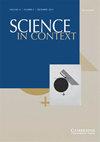Textual materiality and abstraction in mathematics
IF 0.5
4区 哲学
Q2 Arts and Humanities
引用次数: 0
Abstract
In this paper, we wish to explore the role that textual representations play in the creation of new mathematical objects. We do so by analyzing texts by Joseph-Louis Lagrange (1736–1813) and Évariste Galois (1811–1832), which are seen as central to the historical development of the mathematical concept of groups. In our analysis, we consider how the material features of representations relate to the changes in conceptualization that we see in the texts. Against this backdrop, we discuss the idea that new mathematical concepts, in general, are increasingly abstract in the sense of being detached from material configurations. Our analysis supports the opposite view. We suggest that changes in the material aspects of textual representations (i.e., the actual graphic inscriptions) play an active and crucial role in conceptual change. We employ an analytical framework adapted from Bruno Latour’s 1999 account of intertwined material and representational practices in the empirical sciences. This approach facilitates a foregrounding of the interconnection between the conceptual development of mathematics, and the construction, (re-)configuration, and manipulation of the materiality of representations. Our analysis suggests that, in mathematical practice, distinctions between the material and structural features of representations are not permanent and absolute. This problematizes the appropriateness of the distinction between concrete inscriptions and abstract relations in understanding the development of mathematical concepts.数学中的文本物质性和抽象性
在本文中,我们希望探讨文本表述在创造新的数学对象中所发挥的作用。为此,我们分析了约瑟夫-路易-拉格朗日(1736-1813 年)和埃瓦里斯特-伽罗瓦(1811-1832 年)的文本,这些文本被视为群数学概念历史发展的核心。在分析中,我们考虑了表征的物质特征与我们在文本中看到的概念变化之间的关系。在此背景下,我们讨论了这样一种观点,即一般而言,新的数学概念越来越抽象,脱离了物质构型。我们的分析支持相反的观点。我们认为,文本表述的物质方面(即实际的图形铭文)的变化在概念变化中发挥着积极而关键的作用。我们采用的分析框架改编自布鲁诺-拉图尔(Bruno Latour)1999 年关于实证科学中相互交织的物质和表征实践的论述。这种方法有助于突出数学概念发展与表征物质性的构建、(重新)配置和操作之间的相互联系。我们的分析表明,在数学实践中,表征的物质和结构特征之间的区别并不是永久和绝对的。这就质疑了在理解数学概念的发展过程中,具体描述和抽象关系之间的区别是否恰当。
本文章由计算机程序翻译,如有差异,请以英文原文为准。
求助全文
约1分钟内获得全文
求助全文
来源期刊

Science in Context
综合性期刊-科学史与科学哲学
CiteScore
0.80
自引率
0.00%
发文量
1
审稿时长
>12 weeks
期刊介绍:
Science in Context is an international journal edited at The Cohn Institute for the History and Philosophy of Science and Ideas, Tel Aviv University, with the support of the Van Leer Jerusalem Institute. It is devoted to the study of the sciences from the points of view of comparative epistemology and historical sociology of scientific knowledge. The journal is committed to an interdisciplinary approach to the study of science and its cultural development - it does not segregate considerations drawn from history, philosophy and sociology. Controversies within scientific knowledge and debates about methodology are presented in their contexts.
 求助内容:
求助内容: 应助结果提醒方式:
应助结果提醒方式:


